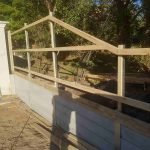Introduction
When it comes to landscaping and home improvement, keeping walls play a vital function in managing soil erosion, producing functional area, and improving visual appeal. Nevertheless, hiring a professional contractor for this task is not always as straightforward as it might appear. From timber sleepers to concrete sleepers, and even the robust H beam systems, the options can be overwhelming. In this post, we'll explore the potential risks you may come across when working with a retaining wall contractor. We'll explore warnings that could show difficulty ahead, ensuring you make a notified choice while purchasing your property.
Hiring a Retaining Wall Contractor: Red Flags to Watch Out For
Building a retaining wall is no little accomplishment. It needs competence, experience, and the best materials. Regrettably, not all specialists possess these qualities. When starting this journey, it's vital to be knowledgeable about specific red flags that might indicate problems down the line.
Understanding Keeping Walls
What Are Retaining Walls?
Retaining walls are structures developed to keep back soil or rock from a building or structure. They are frequently used in hilly or sloped surfaces and can be built from various materials like timber sleepers, concrete blocks, or H beams.
Types of Keeping Walls
Gravity Walls- These count on their weight to resist lateral pressure.
- Made of enhanced concrete; they use utilize to support the soil behind them.
- These are secured using rods or cables anchored in the ground for included support.
- Typically used in soft soils; they consist of long sheets driven into the ground.
- Made of interlocking concrete blocks; these are popular for DIY projects.
Each type has its pros and cons depending upon the particular requirements and conditions of your site.

The Value of Hiring Professionals
Why You Required a Professional Contractor?
When constructing a retaining wall, opting for a professional specialist can save you money and time in the long run. Specialists come geared up with:
- Knowledge of local codes and regulations The capability to assess soil conditions effectively Experience with different products such as timber sleeper and concrete sleeper systems Technical abilities for proper installation
Benefits of Professional Expertise
Quality Assurance: Professionals make sure that your retaining wall is developed according to standards. Time Efficiency: They have processes in location that can finish the job faster. Cost Savings: While preliminary expenses may appear higher, specialists often save you from costly errors later on on.Identifying Warning When Working With Contractors
Lack of Credentials and Licensing
Why Qualifications Matter?
A licensed specialist follow market requirements and regional guidelines. Without appropriate qualifications:
- You threat security violations. The quality of work may be subpar.
How to Check Credentials?
Request copies of licenses. Verify through regional licensing boards. Check online examines for extra assurance.Unclear Quotes or Contracts
Importance of Clearness in Contracts
Contracts function as legal protection for both parties associated with the job. An unclear agreement might lead to misunderstandings concerning costs or timelines.
What Needs to Be Included?
A comprehensive breakdown of materials (consisting of timber sleeper types). Exact task timelines. Payment schedules. Warranty information.Poor Communication Skills
Why Interaction Matters?
Effective interaction is vital throughout any building job as it ensures that both parties are lined up on expectations and progress updates.
Signs of Poor Communication:
- Delays in responses Incomplete responses to your questions Lack of transparency concerning project changes
Insufficient Experience with Maintaining Walls
How Much Experience Is Enough?
Experience matters significantly when it concerns customized projects like retaining walls due to their unique structural requirements.
Questions To Ask Prospective Specialists:
How lots of comparable projects have you completed? Can you offer references? What kinds of products do you recommend?Unverifiable References or Reviews
Importance of References
Trustworthy contractors must easily offer references who can vouch for their work quality and reliability.
How To Vet References?
- Contact previous clients directly. Request photos from finished projects.
Pressure Methods During Negotiation
Recognizing High-pressure Sales Tactics
If a professional hurries you into signing an agreement or makes exaggerated pledges about pricing:
- This could suggest desperation or insecurity about their services.
Understanding Material Quality
While employing a contractor for your retaining wall task, it's vital likewise to consider the materials they plan to use-- be it timber sleeper choices or resilient concrete sleeper systems-- due to the fact that poor material options can jeopardize structural stability over time.
FAQ Section
1. What materials are best for retaining walls?
Timber sleepers are great for aesthetic appeal but might need more maintenance than concrete sleepers which use durability however less visual charm.
2. How do I know if my soil requires reinforcement?
Consulting with a geotechnical engineer can help examine whether your soil postures threats needing reinforced walls like H beams.
3. The length of time does it take to construct a maintaining wall?
Typically between one week and one month depends upon size, complexity, weather, and contractor availability.
4. Do I need licenses for setting up a maintaining wall?
Most municipalities need permits; check with local authorities before starting construction.

5. What happens if my wall fails?
A failing wall can lead to severe security risks including property damage; instant consultation with experts is essential if concerns occur post-installation.
6. Can I set up a retaining wall myself?
While DIY choices exist, without correct understanding or abilities-- especially regarding drain-- you might discover yourself dealing with pricey corrections down the line.
Conclusion
In conclusion, employing a retaining wall specialist requires caution versus prospective red flags that could https://rentry.co/3fwzag2u cause headaches in the future down the road! By being proactive-- examining qualifications thoroughly; guaranteeing clear estimates; establishing effective communication channels; validating experience levels related particularly towards building these structures-- you'll position yourself positively towards attaining successful results!
Remember: investing time upfront will pay dividends when it comes time for installation day! Always prioritize dealing with reputable specialists who understand both looks (like timber sleeper styles) & & functionality (such as concrete sleeper strengths). So keep these pointers close at hand next time you're looking at alternatives-- the future stability & & charm of your landscape depends upon it!